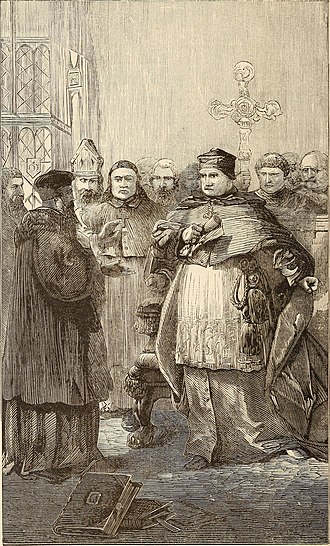Commemoration of Robert Barnes, Confessor and Martyr
Readings: Jeremiah 23:16-29 | Romans 8:12-17 | Matthew 7:15-23
Text: Matthew 7:15-23
This exhortation to beware of false prophets is interestingly placed in the Sermon on the Mount. People often quote Matthew 7:1 “Don’t judge lest you be judged” as a way to stop theological discussion when they don’t like to be confronted with their sins. They say only God can judge, even when it’s pointed out clearly that God has already judged. Sometimes we hear, “Who am I to judge?” when we don’t want to confront people in their sin. It’s a means to look the other way when you have the responsibility to address sin in your vocation.

Yet just a handful of verses after this oft-misused verse, Matthew records Jesus telling every Christian to beware. “Judge!” “Be discerning.” “Watch out!” It’s not just something pastors should do; it’s something every Christian is called upon to do. You are to beware of false prophets. You are to beware of false teachings. So, you are to be discerning about what you hear pastors and theologians saying. You are to beware of anyone who presumes to speak in the place of Jesus, but whose teaching is not consistent with the Words of Holy Scripture. Jesus calls those false prophets wolves (a demonic name) and rotten trees with bad fruit, which should be cut down and thrown into the fire (a designation for hell). This sounds harsh to our easy-going, live-and-let-live ears, but our Lord is trying to impress upon us the seriousness of bad doctrine. People who claim to stand in the stead of Christ and preach or teach false doctrine are demonic and are fit only for the fires of hell. Theology is that serious. It’s not just a playful pastime, or hobby, or something we can “agree to disagree on.”
Today, July 30th, the Lutheran Church remembers Robert Barnes as a confessor and martyr. He lived in England during the time of the Reformation. “Born in 1495, Barnes became the prior of the Augustinian monastery at Cambridge, England. Converted to Lutheran teaching, he shared his insights with many English scholars through writings and personal contacts. During a time of exile to Germany, he became friends with Luther and later wrote a Latin summary of the main doctrines of the Augsburg Confession… Upon his return to England, Barnes shared his Lutheran doctrines and views in person with King Henry VIII and initially had a positive reception. In 1529, Barnes was named royal chaplain. The changing political and ecclesiastical climate in his native country, however, claimed him as a victim; he was burned at the stake in Smithfield in 1540.” (Treasury of Daily Prayer)
Martin Luther remembered him this way, “Now, since this holy martyr, St. Robert Barnes, heard at the time that his King Henry VIII of England was opposed to the pope, he came back to England with the hope of planting the Gospel in his homeland and finally brought it about that it began. To cut a long story short, Henry of England was pleased with him, as is his way, until he sent him to us at Wittenberg in the marriage matter.

Dr. Robert Barnes himself often said to me: “My king does not care about religion, but he is…” Yet he loved his king and homeland so keenly that he willingly endured everything like that and always thought to help England. And it is indeed true that one who would not be optimistic toward his homeland and would not wish everything good for his prince must be a shameful rogue, as not only the Scriptures but also all our laws teach. He always had these words in his mouth: “my king, my king,” as his confession indeed indicates that even until his death he was loyal toward his king with all love and faithfulness, which was repaid by Henry with evil. Hope betrayed him. For he always hoped his king would become good in the end.”[1]
Robert Barnes is the life lived of a true prophet, when all King Henry VIII wanted was a false prophet. The King cared about a male heir and having his pleasure more than he cared about the God who said, “What God has brought together, let no man [even the King] rent asunder.” (Mark 10:9)
It’s popular today, however, to find reasons to be lazy about this. Christian is Christian. Why can’t we get together with other Christians in worship? After all, so many different churches participate in Transform Lebanon. To be honest, I would love to be able to do that. The problem is false doctrine. False teaching is poison to faith. It’s dangerous, and so much is let in by churches that don’t realize this or actively teach falsely.
For the first part, it’s done in ignorance, following traditions that insist that Baptism is merely a symbol; that there’s nothing more special about the Lord’s Supper than a personal remembrance. How do you become a Christian? Well certainly it’s by praying the Sinner’s Prayer and getting baptized. How do you know you’re really a Christian? You must have manifestations of the Holy Spirit’s gifts, like speaking in tongues. Most people in such churches have just been taught these things, and their teachers were taught these things before them. If only they would open the Bible without commentary by teachers who had a vitriol toward all things that appeared Roman Catholic, or who were desperate to find the distinguishing line between the “wheat and the tares” (the true believers from the hypocrites).
But there’s also those who actively teach contrary to Scripture. The false prophets are those who encourage the devil’s lies supposedly under the banner of the Triune God. “All are welcome here” is a moniker to say you will not be called out for your sins against God and your neighbor. Such teachers insist that Jesus is not the only way to the Father, because our sins are not that bad—at least when compared to others. For example, they say that the sin of Sodom was failing to show hospitality,[2] not the fact that the men were inflamed with lust for each other [Romans 1:26-27, Jude 6-7]. This is deadly error! Would you rather have peace at the Thanksgiving dinner table while for eternity your relatives are suffering in hell?

It’s a cross to bear to hold to true doctrine, and to watch out for false teaching. The Missouri Synod is troubled by this in what’s euphemistically called the “worship wars.” It’s argued that many other churches have praise bands, and many other Christians sing songs that we don’t in our church. And the crudest weapon in this war is, “Well, it ‘works’ for these other churches because they attract so many people.” Other arguments have been made that there’s no divine command to only sing by the organ or piano. But these are a distraction from the real problem: if we’re being faithful to the words of God, we are obligated to care about what is being taught—even by what we sing and how the worship service is ordered. “Here I am to worship, here I am to bow down” has appealing, sentimental chord progressions, but it fails to confess the God who, while we were still sinners and His enemies, gave His Son for us and that only His Holy Spirit has the power to create and keep us in this saving faith. Your beloved country singers may have sung, “On a hill far away stood an old rugged cross, the emblem of suffering and shame” and it’s beautiful to marvel in the cross. But what’s missing from that song is that the cross is brought right here to us in Holy Baptism, “Do you not know that all of us who have been baptized into Christ Jesus were baptized into his death?… [and] if we have been united with him in a death like his, we shall certainly be united with him in a resurrection like his.” (Rom. 6:3-5) and the Eucharist: “19 And [Jesus] took bread, and when he had given thanks, he broke it and gave it to them, saying, ‘This is my body, which is given for you. Do this in remembrance of me.’ 20 And likewise the cup after they had eaten, saying, “This cup that is poured out for you is the new covenant in my blood.” (Luke 22:19-20)
Theology matters because truth matters. Our God is a God of truth. And if “Man shall not live by bread alone, but by every word that comes from the mouth of God” (Matthew 4:4), then every Word that comes from our Lord is precious to us and to be held in the highest regard. We hear our Lord’s teaching today because not one of us is immune to the false spirits. The devil seeks to focus us on the moment, changing the truth into what we want it to be for our own gain and pleasure. But Jesus says: “Beware of false prophets, who come to you in sheep’s clothing, but inwardly they are ravenous wolves.” It is the way of evil to dress itself up in what looks good and salutary, to appear as though it is honorable. The Bible says that the devil himself comes not as the wicked destroyer that he is, but as an angel of light, appearing to be holy and good [2 Corinthians 11:14]. So also, false prophets come looking like sheep of the Good Shepherd. They may even firmly believe they are sheep of the Shepherd, not knowing that their fruit is bad, but you can recognize by their teaching and doctrines that they are not. Falsehood is much more dangerous when it is wrapped up in what appears to be the truth.
Jesus says beware, and He does not leave you without a guide and means to judge false prophets. The apostle Paul teaches clearly of the armor that is for the children of God–the Holy Spirit. The Holy Spirit guards you against false prophets and false teachings in concrete ways. He caused the Holy Scriptures to be written for our protection. In the Bible, the very Word of God is your shield against spiritual wolves.
But you might be tempted to say, “I’m no theologian; I’m not a Bible expert. How do I distinguish a false teacher from a genuine teacher, when both appeal to the Scripture? How can I tell whether or not someone is preaching the truth of Christ’s Word?” The simplest answer is the most profound. Recount the words of your Christian instruction from the Small Catechism.

Review the Ten Commandments (Exodus 20:1-17 or Deuteronomy 5:6-21), the Creeds (Nicene, Apostles’, & Athanasian), and the Lord’s Prayer (Matthew 6:5–13 or Luke 11:1-4). You memorized these portions of Holy Scripture for ongoing protection throughout life.
- How do you know that living together outside of marriage is a sin?—the sixth commandment. (Exodus 20:14 or Deuteronomy 5:18)
- How do you know that the same-sex and transgenderism is sinful?—the sixth commandment (and your Sunday School instruction on Genesis 1-2 and Matthew 19).
- How do you know that talking poorly about your neighbor behind his back is a sin?—The eighth commandment.
- How do you know that Jesus is the only Lord and Savior worthy of our worship? He says you shall have no other gods.
- The Creed shows you who your Savior is.
- How do you know that God wants you in Church to hear His Word and receive His Supper? He commands you to do so and then promises blessings on account of Jesus.
That way of salvation is narrow because it doesn’t let in any of the opinions or the qualifications of men. Rather, it admits only the merits of Christ and His righteousness. He alone is the one through whom we gain entrance into heaven. Our Lord alone is the way which leads to everlasting life, for He said, “I am the way and the truth and the life. No one comes to the Father except through Me.” His is a difficult and unpopular way, because it flows from His cross and through His cross. He has blazed that trail by way of Calvary. It is into this way that you have been baptized, and now you share in the life He has won. Through the cross you have been entirely forgiven of all your sins. Through His suffering and death, He has provided a shield for you against your flesh, the world, and the devil. And through His resurrection, you have been raised to new life in Him. “The Spirit himself bears witness with our spirit that we are children of God, and if children, then heirs–heirs of God and fellow heirs with Christ” (Romans 8:16-17).
In the Name + of Jesus. Amen.

[1] Martin Luther, “Preface to Robert Barnes Confessio Fidei (1540).” Translated by Mark DeGarmeaux
[2] https://www.gaychristian101.com/Inhospitality.html


